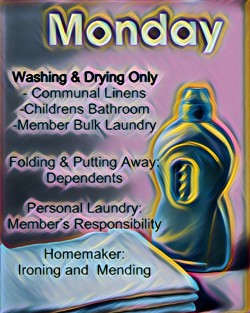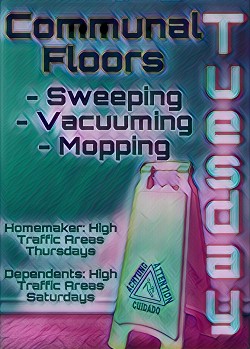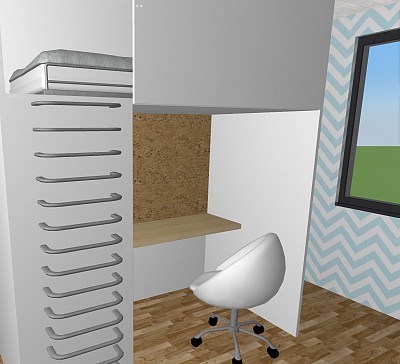How We Live Together
Keeping a Household
The secret to running an efficiently kept household is doing the simple tasks daily, so messes and clutter never get out of control. Small tasks add up quickly; so if it takes less than a minute to complete, try to do it immediately.
- Dirty countertops attract pests and make your kitchen look awful
- Keep disinfecting wipes handy in public bathrooms
- Wipe the sink and faucet after you’re done to prevent the spread of germs
- It is not the homemaker’s responsibility to clean up after grown adults
Daily Tasks
The upkeep of private spaces is at the general discretion of the individual member, the following list is for the maintenance of the communal areas of the property:
- Wipe down bathroom surfaces
- Squeegee shower doors, walls, and floors after every use
- Wash dishes after each use
- Sweep or vacuum any heavily trafficked areas
- Put things back where they belong after you’re done with them
Each member and dependent have an expected amount of participation in this process.
Weekly Chore Assignment System
- Daily Responsibilities: Each day of the week is dedicated to specific communal responsibilities. These can range from cleaning shared spaces, managing waste and recycling, to more specialized tasks like garden maintenance or bulk meal item preparation.
- Member Assignments: To ensure equitable distribution of work, each member is assigned to one specific chore day per week.
This allows every member to contribute fairly, rotating through different responsibilities to keep the schedule dynamic and balanced.
- Flexible Assignments: Recognizing that members have varying schedules and capabilities, the chore system is designed to accommodate personal commitments while still fulfilling managing communal responsibilities.
Benefits of the Chore System
- Equity and Fairness: The chore rotation ensures that no single member is consistently burdened with more demanding tasks than others. This fosters a sense of fairness and mutual respect among all members.
- Community Engagement: Regular participation strengthens the connection members feel towards their living space and each other, fostering a strong communal bond.
- Skill Development: The variety in chores allows members to learn and hone different skills, enhancing their personal development and contributing to the community’s self-sufficiency.
- Transparency and Communication: Clear communication about chore assignments and expectations is central to the system’s success. Regular meetings and updates help ensure that everyone is informed and any issues are addressed promptly.
Through this system, we ensure that all members are actively involved in the upkeep of their community, fostering an environment of shared responsibility and cooperation.
The Household-Level MealPrep Program
At the household level, adult members take turns preparing meals for the rest of the household.
Each household maintains a basic pantry, stocked by groceries bought with communal funds.
Members have full access to these ingredients when preparing meals. However, any additional or specialty ingredients not stocked in the pantry must be provided at the member’s expense.
- Meals are served buffet style
- Leftovers are portioned out for refrigeration or freezing
- Dependents contribute with age-appropriate kitchen and dining tasks
Basic Principles of Communal Meal Prep
The household meal preparation process is more than just cooking—it’s a collaborative effort designed to ensure that every member of the household has access to nutritious and cost-effective meals.
1. Shared Responsibility
Meal preparation is a collective effort. Members take turns planning, cooking, and cleaning, ensuring that the workload is evenly distributed and that no one is left to manage the kitchen alone.
2. Efficient Planning & Organization
Households utilize a structured system for meal planning that includes:
- Bulk purchasing and pantry management to minimize waste and reduce costs
- Standardized portion guidelines to maintain consistency and accommodate all members
4. Household Pantry Access
The household pantry is a shared resource, stocked with basic staples, based on collective input, from the common household purse. Access is tied to MealPrep participation, ensuring that all members who contribute to, also benefit from, the system equitably.
5. Community Experience
Whenever possible, meals serve as a communal event to encourage social engagement and strengthen household bonds. While flexibility is allowed, the goal is to foster connection through shared mealtimes.
6. Adaptability & Respect
While the system is structured, it remains adaptable. Members communicate openly about dietary needs, scheduling conflicts, and preferences, allowing for flexibility while maintaining fairness.
By following these principles, the MealPrep process ensures efficiency, promotes cooperation, and supports the well-being of all household members.
MealPrep Scheduling
The MealPrep scheduling process ensures a fair and structured approach to meal preparation, balancing responsibility while maintaining flexibility.
1. Rotation by Member Room
Meal assignments follow a room-based rotation, meaning each room is responsible for one meal slot, regardless of whether it is single or double occupancy. This ensures an equitable distribution of duties across all household members.
2. Menu Development
The pioneering household is responsible for developing a general, weekly menu that features meals suitable for community consumption. These meals should be:
- Easy to prepare
- Customizable to individual preferences
- Nutritionally balanced
Members have the opportunity to submit new recipes for household approval during the weekly meeting prior to their assigned cooking day.
3. Assignments & Volunteering
Beyond the designated meal preparer, additional support is structured through:
- Dependent Assignment Chart – Dependent members participate in age-appropriate kitchen tasks, reinforcing structured independence.
- Volunteer Signup – Open for members who wish to assist. There is unlimited availability for gardening-related tasks but limited availability for kitchen tasks to ensure efficiency and prevent overcrowding.
This structured system maintains fairness while keeping meal preparation efficient and enjoyable for all household members.
Benefits of a Meal Sharing Program
Meal sharing is more than just a convenience—it’s a cornerstone of community living that enhances efficiency, affordability, and social connection. At Finding Camelot, our meal sharing program fosters a sense of belonging while ensuring that members receive nutritious, home-cooked meals without the burden of daily meal prep falling on any single individual.
1. Cost Efficiency & Reduced Waste
- Households can purchase ingredients in bulk, significantly reducing grocery expenses
- Helps minimize food waste by ensuring that ingredients are used efficiently across planned meals
2. Time-Saving & Reduced Workload
- With a structured MealPrep schedule, each member takes a turn which the time individuals spend cooking daily
- This creates more personal free time while ensuring that meals are still homemade.
3. Nutritional Balance & Dietary Consideration
- A planned meal-sharing system allows for better meal variety and nutritional balance
- Meals are designed to be nutritionally complete while also accommodating dietary restrictions and preferences through customizable options.
4. Strengthened Community Bonds
- Shared meals create opportunities for social engagement
- Sitting down together fosters a sense of unity and strengthens interpersonal connections
5. Skill Building & Cultural Exchange
- Members can improve their cooking skills and share food traditions
- This creates an enriching environment where everyone benefits from diverse culinary knowledge
6. Stress Reduction & Mental Well-Being
- The burden of daily meal planning and preparation can be overwhelming
- Meal sharing eases stress by offering predictability and reliability
- Members have access to prepared meals without the mental strain of cooking daily
Through our meal sharing program, Finding Camelot ensures that meals are a communal experience that promotes efficiency, connection, and overall well-being.
Understanding the MealShare Program
MealShare takes the communal meal prep model and scales it beyond individual households, using community membership to supplement grocery costs.
This expansion allows for extra meal portions, which can be accessed by members outside the household unit at an affordable rate.
MealShare embodies Finding Camelot’s commitment to sustainability and inclusivity:
- Reducing Food Waste: Bulk purchasing and shared meal planning reduce waste and maximize resources.
- Promoting Inclusion: MealShare ensures that no one is left out, regardless of financial circumstances or culinary skills.
Household Childcare Program
The Household Childcare Program operates on a rotational schedule by individual. This ensures that responsibility is distributed fairly across all household members.
This program is designed to provide age-appropriate guidance for all residence’s dependants.
The level of supervision needed is based on the dependent’s age; fostering a balanced approach to independence and responsibility and maintaining a casual environment rather than that of a structured daycare system.
Direct Guidance (6 & Under)
- The primary focus of the household childcare program is on the youngest dependents
- This ensures they receive direct supervision and foundational guidance
- The focus is on early communication skills, basic morality, and social development,
- To prepare them for structured independence as they grow.
Responsibility & Autonomy (7-12)
- This age group has more household responsibilities and thus more freedom and autonomy
- The assigned caregiver remains available in proximity
- The children are encouraged to make their own choices within a framework of clear expectations and consequences
Independence Adjacent (13+)
- The oldest dependents no longer require direct or indirect supervision
- They self-manage their time and responsibilities
Scheduling & Review Process
- A rotational schedule is set at the beginning of each month to ensure all caregivers know their assigned days
- It is reviewed during weekly household meetings to address any conflicts or adjustments needed
Our approach ensures that dependents receive the support they need while gradually developing independence.
This reinforcing Finding Camelot’s principles of structured independence, personal autonomy, and cooperative responsibility.
Communal Accommodations and Structured Independence by Age Group
For ar least the first year, dependents reside in the room with the member who sponsors their add-on.
- Basic necessities such as diapers, cereal, and formula are kept stocked in the household pantry
Early Childhood (Ages 1-6)
Dependents are eligible to transition to the communal setting at one-year-old; in this stage of development emotional regulation, boundaries, and effective communication are emphasized. Dependents under age 7 focus on developing foundational life skills under the supervision of an assigned caregiver and participate in developmentally appropriate chores.
This includes:
- Picking up after themselves
- Making their bed
- Folding common-use towels and washcloths
- Simple cleaning tasks like dusting baseboards
Until the age of 7, children have the least autonomy and until 13 they have the least privacy. Dependants quarters are located in their own wing and outfitted with bunk beds and share communal bathroom facilities.
Middle Childhood (Ages 7-12)
Once children reach the age of 7, they assume a share of the group responsibilities set by the household.
This includes:
- Dinner dining room setup and cleanup
- Start dinner dishes in dishwasher
- Preparing and freezing bulk meal items
- Collecting and distributing communal laundry
- Domestic upkeep of the dependent living quarters
This age group is not directly supervised but they do have clearly defined expectations and consequences and the autonomy to exercise their freewill in a safe and nurturing environment.
Adolescence (Ages 13-17)
At age 13, dependents transition to cubicle-style dormitory, featuring fully enclosed loft beds with a private desk and wardrobe underneath. At this stage, personal responsibilities are added to the group responsibilities.
This includes:
- Managing their own laundry
- Maintaining their personal space
- Upkeep of the dormitory and wet rooms
- Staying accountable for their educational performance
- Contributing one weekend night per month to household childcare
We frame adulthood as a goal to aspire to; not an inevitability to be avoided.
With the ultimate objective being to have young adults who are confident, capable, and compassionate, this approach rewards responsibility and participation with autotomy and privacy.
Benefits of a Communal Childcare
Communal childcare integrates caregiving into the fabric of household life, to ensure that children receive consistent guidance while adults share the workload in a sustainable and practical way.
1. Shared Responsibility & Reduced Burden
- The communal approach distributes childcare responsibilities among multiple caregivers
- This prevents burnout by ensuring no single adult carries the full burden
- Parents gain flexibility in their schedules while knowing that children are receiving attentive, high-quality care
2. Social & Emotional Development
- Children interact with multiple caregivers and peers their own age
- Improving their social skills and ability to form healthy relationships is a primary focus
- Exposure to a variety of adults with different strengths and perspectives helps broaden emotional intelligence and adaptability
3. Independence & Responsibility
- Children are gradually introduced to age-appropriate levels of autonomy
- They gain a sense of personal responsibility and independence
- Older dependants serve as role models for peer mentorship and accountability
4. Strengthened Community Bonds
- Communal childcare encourages deeper connections among members
- Fosters a sense of trust and collective investment in each child’s well-being.
- Households operate as tight-knit support networks
- Members can rely on one another for guidance and support.
5. Consistency & Stability
- A structured environment ensures that children receive consistent routines and guidance
- Provides stability that is crucial for cognitive and emotional growth
- Creates an atmosphere where morals, communication skills, and cooperation are reinforced daily
- Ensures that children grow into well-adjusted and self-sufficient adults.
Finding Camelot ensures that every child is nurtured within a framework that balances support, structure, and independence.
By adopting a communal childcare approach, we are creating a foundation for healthy development and long-term success.
Understanding the Core Principles of CareShare
CareShare is a unique, household-based childcare program developed by Finding Camelot to address the challenges of modern parenting while fostering collective responsibility and mutual support among members.
It operates on a household rotational schedule, where members take turns providing care for each other’s children.
This innovative approach combines practicality with emotional and social benefits, creating a nurturing environment for both children and parents.
1. Shared Responsibility
- Caregiving is distributed among trusted members of the household, ensuring that no single parent or guardian is overwhelmed.
- This fosters a culture of collaboration and reduces the emotional and physical strain on individual caregivers.
2. Community Support
- CareShare builds a support network where parents and guardians can rely on others for assistance, particularly during emergencies or challenging times.
- Children benefit from exposure to diverse perspectives and relationships within the community.
3. Cost-Effective Solution
- By pooling resources and sharing responsibilities, CareShare eliminates the high costs associated with traditional childcare services, making it a financially sustainable option for members.
Sustainable Funding and Financial Empowerment
Our approach to financing is the backbone of our system. By using only donated funds for building our network we keep membership contributions at the local level, ensuring the sustainable success of every household.
By investing donated funds into property, we create a self-sustaining household system, ensuring that external financial support is only required for a finite period.
- Donated funds are strategically allocated to the purchase, renovation, and/or construction of properties that serve as the foundation for sustainable household units.
- Once a property becomes available to members for occupancy, it is set up with an independent Cash App account under Finding Camelot's nonprofit, umbrella, checking account.
- Every household operates autonomously, with no direct intervention from the nonprofit proper, unless explicitly requested.
Financial Autonomy in Every Household
Each Finding Camelot household operates as a self-sustaining unit, ensuring that funds contributed by members directly support the household they belong to. This system promotes financial autonomy, communal responsibility, and long-term sustainability.
Membership Dues
- Each member deposits their monthly membership dues into a property-specific Cash App account designated for that household.
- The account is registered under the nonprofit’s umbrella checking account, but the organization has no access to or control over these funds—ensuring that only the household’s residents manage their finances.
Fund Management
- Direct Withdrawals: Household operating expenses—such as the mortgage, utilities, maintenance, and shared services—are paid directly from this account.
- Reinvestment: Any leftover funds remain within the household and can be used for improvements, emergency reserves, or community needs—as determined by the occupants themselves.

















